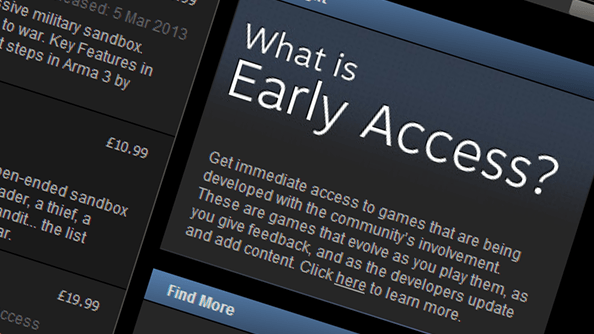To Early Access or not to Early Access, the small dev’s dilemma!
There’s been increasing bad rep attached to Early Access (EA) games and not without merit. So many games on EA stay there forever, don’t get updated, or just fail on their promises to the player. Apparently, only 25% of Early Access games are actually completed and released! That’s bad, right?
So no wonder that players and journalists are very sceptical when it comes to these games. And it’s not just unknown, small indies that fail to deliver, no, even well-established names and titles in the industry can fall into this category. Peter Molyneux’ Godus is a good example of how players can get totally screwed by relative big shots. And there are more titles that continue to disappoint.
There are of course great success stories, to name one that is my personal favourite, Divinity: Original Sin went through Early Access, Kickstarter and came out on the other side with flying colour. And so, there are numerous success stories to take comfort in, check out The Escapist list of worthwile titles for example.
But there are also all the horror stories and endless disappointments, Valve has even released a warning to players, stating that developers have no real obligation to finish their EA games, and this does not inspire confidence.
As developers, all this bad karma is quite frankly terrifying. For those of us who self-fund their projects, or just have very tight budgets, Early Access is not a way to cash in on easy money (well, ok, it shouldn’t be), it is a way to complete our games as well as we possibly can. Lacking in budgets for serious testing and extra features, EA offers a unique chance not only to test the waters for your baby, see if has a chance to swim, but to make it better. And in exchange, our fans get the chance to have input, to shape the final release – or at least that’s how I feel this should go.
From a small indie dev point of view, (and it my personal view only) here some pros and cons we’re facing:
Cons and dangers:
- You don’t get a second chance at a first impression – this one, for me, is the toughest nut to crack. This is why I believe EA games should only be released if you’re at least close to your finished product.
- Players are very sceptical about EA releases these days – as mentioned earlier, players have learnt the hard way that EA may mean money spent on an unfinished product that will never see the light of day.
- Split release hype, links to the first point slightly, in that I feel as a small studio, you only have so much PR/marketing pull and you now have to divide it between EA and later full release, so how do you get the public excited twice, right?
- Getting stuck in an endless repair loop – so we all want our babies to be perfect, you get your game to EA, it has tons of feedback daily, you end up tweaking it, and tweaking it and tweaking it… yeah, I can see the trap there, this is why I think a firm release schedule is essential!
Pros
- Every little helps – a key sentiment for a small, self-funded studio (as I said, I am writing it from that perspective, so it may be different for bigger guns) Money is almost a dirty word when you’re an indie, you’re supposed to be all about the creativity, and we are, but our budgets are also wafer thin and any extra cash can mean the world in terms of polishing the game.
- Player feedback- again, applies to smaller studios more, ones that have no real budgets for professional testing and rely often of friends and family. Having the game in EA for a time, allows for communication with the fans, catching any last minute tragedies and generally making sure you listen to the people and have a chance to change your game before you finally let it go into the real world.
- Building communities – another one for smaller studios, that perhaps didn’t have the manpower and time to build a huge following, EA can help to do just that.
- Dipping your toes – when you’re working in a small group, often for at least a year or two, completely focused on that little gem you’re all creating, it is really personal. To then throw it out into the world, often with little support in terms of marketing campaigns etc. well, it is outright terrifying! So Early Access is kind of a security net, a nice blanket you can hide behind and say – hey, here is our game, it’s almost done, but still needs a few tweaks, have a go let us know what you think… It may not sound like much, but it can save a few of us from heart attacks and nervous breakdowns you know!
For a good discussion check out an interesting article here, but there are loads more out there!
At the end of the day, however, if you fail at the no 1 con: ‘you don’t get a second chance at a first impression’ – all else is likely to fall into pieces. So my feeling is, only get your game to EA when it is fun to play already and don’t drag it out for an eternity!
The debate will continue and there is no true answer. Our own game will be out in that mad hot pot of EA titles very soon, and I suppose only then will I be able to truly say if it was worth it. Until then, it’s holding my breath and keeping all fingers crossed until we survive it all!










Published: Sep 13, 2015 04:30 am